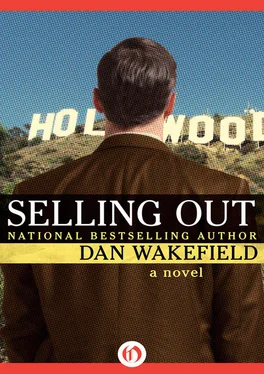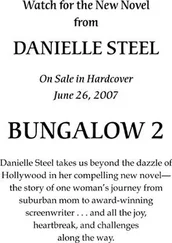“We’d have to go to San Jose on commercial flights,” Archer explained, “but I can take us right into Saratoga, where the college is. There’s a small airfield at the edge of town. Saves lots of time.”
“What a guy!” Ned said, throwing up his hands in tribute.
Kenton shifted his great bulk uneasily in his chair.
“Somebody better stay here and mind the store,” he said. “I’d like to keep an eye on that set they’re building for Jack and Laurie’s living room.”
Archer nodded.
“Perry, you get to work on those last notes from the network,” he said. “See if you can wrap up revisions by tomorrow.”
Archer pulled a couple of automatic cameras out of a drawer and tossed one to Ned as he flung the other around his neck.
“We’ll take plenty of shots for you people,” he assured Kenton and Perry with a brisk nod. “Come on, Ned—my Cessna’s at Santa Monica.”
Perry jumped up to get to his own task, exhilarated. It was like being in on a great military campaign, with excitement mounting as the shooting drew near.
“Great news!” Perry called out to Jane when he burst in the door that night. “We get to shoot on location!”
“Oh my God,” she said.
She looked stricken.
“What the hell’s the matter?” Perry demanded.
Jane sat down on the couch, holding her arms over her stomach as if she were fighting the onset of appendicitis.
“I thought that was all off,” she said.
“The network loved the script so much they’re willing to pay for it! You ought to be thrilled—this is a triumph!”
“Darling, I’m happy for you. But I just can’t turn around and go back to Vermont, especially after this last trip, after all the explanations, all the good-byes. I’m not a human Ping-Pong ball.”
Perry smiled and sighed.
“Lovey,” he said, sitting down and putting an arm around her, “this has nothing to do with Vermont. The cost of that would be prohibitive—I thought you understood that.”
“But you just said they like it so much they’re willing to pay to go on location.”
“Not in Ver mont . That’s out of the question. Archer found a place up north that he said has real New England ambience. He and Ned flew there today to scout locations.”
“Up north?” she asked. “You mean Canada? I guess that would have a similar look.”
“Not Canada, lovey. It’s a college in a little town called Saratoga, near San Jose. California.”
“San Jose! What in the name of heaven is New Englandy about San Jose? It’s not even as far north as San Francisco!”
“How do you know? You haven’t even been there.”
Jane shook her head, smiling ruefully.
“Remember when you told Archer it had to be filmed in Vermont or the story wouldn’t make sense?”
“That was ages ago, before I understood the realities.”
Jane started giggling.
“What the hell’s so funny?”
“Maybe no one will notice the redwoods,” she said. “Maybe they can be disguised as giant pine trees.”
“You really are hilarious,” Perry said.
It was like standing in the middle of a dream.
His own dream.
This was the living room of Jack and Laurie’s apartment, just as he’d conceived it—a combination of Salvation Army funk and academic chic. There was a swayback couch strewn with bright-colored corduroy pillows, blond Scandinavian-design chairs around a matching breakfast table, brick-and-board bookcases that held not only well-worn volumes but also gleaming chrome stereo components. There was the dark-shellacked door resting on sawhorses that held Jack’s old Smith Corona as well as a mess of his books and papers. There was even Laurie’s cello propped in a corner of the room next to an ironing board. There were framed posters of colored photographs on the wall: the tall wineglass filled with big, ripe strawberries that represented to them the abundance of life, and the canoe, empty except for the paddles pointing out to sea, that they knew meant the wonderful “mystery” of life, that high afternoon they bought the posters.
It was eerie, standing and walking around in that imagined room that now was real.
Or was it?
Perry suddenly plopped down into a chair to make sure it was solid, and not the stuff of dreams, or the illusion of madness.
The chair held him. Relieved, he stood up, walked to the bookshelves and pulled out a book, at random.
He looked at it and frowned.
It was one of those old one-volume Reader’s Digest condensations.
“What’s the matter?” Ned Gurney asked.
Perry looked up and saw that the two men standing with Ned were leaning forward, hanging on every word, looking as anxious as if they were about to hear a guilty verdict that would send them both to death row.
“Oh, it’s no big deal,” Perry said quickly. “It’s just that a couple of grad students like Jack and Laurie would never have a book like this—a condensed book.”
Tom, the big man who looked like a stevedore, grabbed the book out of Perry’s hand, turned to the open side of the room that had no wall and hurled the book off the set.
“I’m sorry,” said Larry, the fragile-looking man who served as Tom’s assistant. “I pick up books by the boxful to stock shelves like this, it usually doesn’t matter which books they really are.”
“It doesn’t really matter here either,” said Ned. “The camera would never even pick up the title out of a whole shelf.”
“It matters,” said Tom, “that Perry here knows it was the wrong book to be in this room. We want this room to feel right, to be right, down to the last thumbtack in Jack’s bulletin board.”
Ned grinned and turned to Perry.
“These guys are the best,” he said. “They’ll get anything you want, from stained glass windows to real lightning bugs in mason jars.”
“We did that once,” Tom said proudly. “Got lightning bugs. For a ‘Waltons’ episode.”
“Oh, we’ll get you whatever you want,” Larry said. “And don’t you hesitate to tell us if it isn’t just right, Mr. Moss. After all, you’re the creator.”
Larry spoke the term with real awe.
The creator liked that.
He liked being recognized and appreciated, not only as a literary talent but now, for the first time in his life, the creator not only of stories but of jobs for all the people whose work it was to bring his fiction to life on film—the prop men like Tom and Larry, the set designer who built the living room he stood in, the set decorator who selected the furnishings, the location man who scouted places for exterior shooting, the camera crew that would soon begin shooting the two-hour script, the makeup people and hairdressers, the gofers and drivers, the whole array of men and women and their spouses and children who were now being supported, provided with food and clothing and medical benefits, all by the mere exercise of Perry’s talent.
This was a far cry, a whole different order of experience and responsibility, from publishing a short story in the Hudson Review .
The heady feeling of power and command increased when he and Ned stopped in Kenton’s office and saw the young director poring over the storyboard. The storyboard was like the master plan of any production, a long, graphlike chart showing each day of the shooting schedule, color-coded according to scenes, locations, and cast members. It was intricate and awesome, like some elaborate plan for the invasion of an enemy country, with troops and equipment amassed for carefully coordinated split-second action, yet all the more inspiring because this was not a campaign of destruction, but of creation.
“After all, you’re the creator.”
Larry’s awed reminder rang in Perry’s ears as he drove home from the studio that evening. Shooting was to start in two days. He had done it. He felt like celebrating.
Читать дальше












